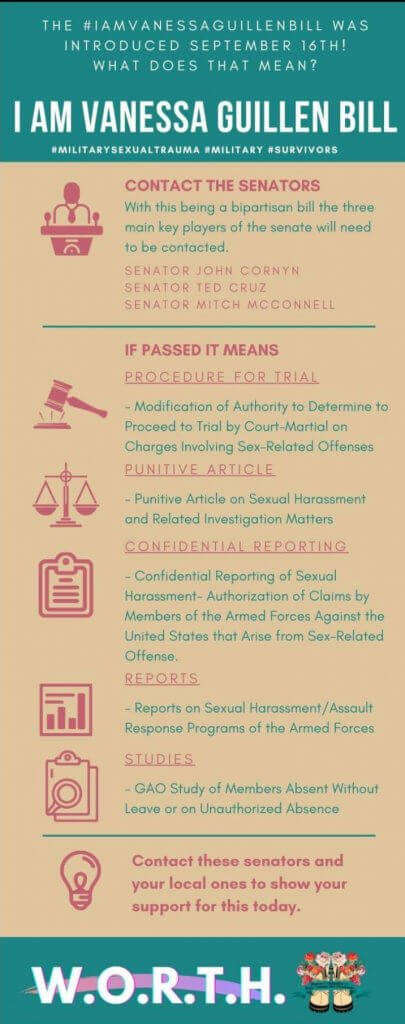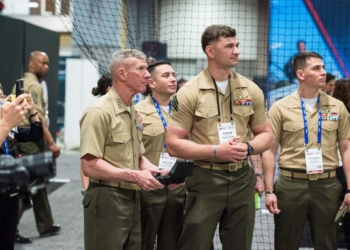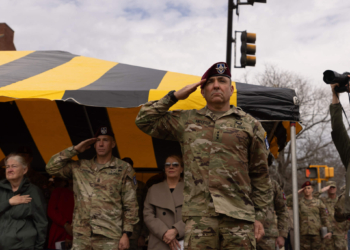“We are Vanessa Guillen” is a phrase echoing across military bases, as women everywhere reel from the murder of the 20-year-old Fort Hood soldier earlier this year.
Two sailors set out to give service women and veterans a space to share their own experiences and impact a culture change within the military. Petty Officer 3rd Class Taylor Larsen and Petty Officer 2nd Class Jeri Black created Warrior’s Opposition to Rape, Trauma, and Harassment (WORTH) — a Facebook group focused on sharing stories of sexual assault, harassment, or any other negative experiences that have occurred, according to the group’s description. They never expected it to become a part of a viral movement.
The group has grown to over 13,000 members and 91% of the members polled within the group have one thing in common:
They were sexually harassed and/or assaulted while serving in the military and they want to change the culture from within, now.
The movement caught the attention of Master Chief Petty Officer of the Navy Russell Smith. His office opened up a line of communication this summer to talk about the current culture of the Navy and talk about possible short-term and long-term solutions.
From an organizational standpoint, the issue not only affects mission readiness, but also the long-term health and well-being of victims and military families. Studies have shown that when a perpetrator goes unchecked, it increases the risk that he or she may groom another victim and/or continue their abuse, putting the entire military community at risk.
The Navy Sexual Assault Prevention and Response Program (SAPR) isn’t just there for active-duty survivors of sexual assault. The program is for all service members.
One of the most pressing issues noted in the meeting with Smith is that many are simply unaware of the programs that they can utilize when they need help. All service members and their dependents over the age of 18 are able to utilize the following resources:
- Access to the SAFE Helpline: 1-877-995-5247, which is 24/7 support for survivors of sexual assault for all branches of the military and a great starting point for anyone wanting to report an incident.
- A Sexual Assault Response Coordinator (SARC) and Sexual Assault Prevention and Response Victim Advocates (SAPR VAs) can assist victims by helping them to file a restricted or an unrestricted report, set up counseling at Fleet and Family, or even go with them to meet with NCIS and/or to take the victim to get a SAFE kit done at a medical facility.
- Anyone that has filed a restricted report can utilize the CATCH Program, designed to help catch a serial repeat offender. Please note: changes were made to the CATCH program after the Navy launched the program and currently they are only utilizing it for restricted reports, as those offenders are not reprimanded.
- Access to professional Special Victims’ Counsel (SVC) and Victims’ Legal Counsel (VLC) who provide legal representation, support in exercising their legal rights, and help navigating the military legal justice system.
Unfortunately, even with annual training on sexual harassment and assault, both still persist.
One of the obstacles is that in many commands, training to prevent sexual harassment and assault can become another check in the box for leadership. This perception among service members can add to the current perceived rape culture of the military.
Prior to the meeting with Smith, Larsen and Black reached out to members of the WORTH group to assess ideas, possible changes and solutions they could offer to Smith and Navy leadership.

The ideas presented include:
- Starting education during the Delayed Entry Program regarding what sexual harassment and assault are, how to handle it and what resources are available to those in the DEP program.
- Obligate doctors at MEPs to disclose what they are doing during their exams and obtain consent from the patient being examined.
- Utilization of surveys so that people could privately disclose issues at their commands.
- Self-defense classes starting in basic training.
- Quarterly focus-groups of smaller groups of sailors, with the intent to give more personalized presentations.
- SAPR VAs to become their own billet or have an NEC. (Navy Enlisted Classification, which is a four digit code used to identify skills beyond the standard, such as how the Corpsman rate has an NEC for pharmacy technicians.)
- Training for senior enlisted leadership and officers to reinforce the definition of consent, harassment and what assault looks like, and how and when to intervene when they see it at their commands.
- Online reporting for victims.
- Changing the current SAPR training content to include what grooming looks like as well as putting more overall focus on the perpetrator so that people can know what precursors to look for and what types of punishment someone would face.
- Guest speakers at SAPR training, with possibilities of hearing from the perpetrators, survivors and family members of both as well as more interactive training.
- Drills to test how people handle real-life situations and find any deficiencies.
Going forward, Larson and Black say they were pleased with Smith’s receptiveness to ideas and solutions. While some solutions may not be able to be implemented Navy wide, they are excited about continuing the discussions with Smith and senior Navy leadership in 2021.







































